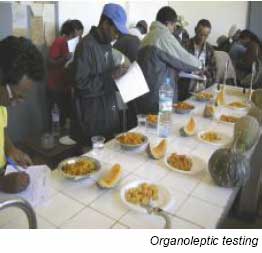Tainan, Taiwan
July 10, 2009
The perfect pumpkin
Source:
AVRDC - The World Vegetable
Center - Newsletter
Dr. Martin Yeboah,
Vegetable Breeder and
Alice
Rahantanirina, Research Assistant, both vBSS Madagascar.
Vegetable Breeding and Seed System
(vBSS) Madagascar put a number of pumpkin lines to the test. The
purpose: Identify a line that performs well under the local
conditions and also pleases the taste buds of local consumers.
|
 |
Pumpkin (Cucurbita maxima /
moschata) is an important crop in Madagascar and its spoke
countries. It is
grown for the leaves, fruits, flowers, and seeds. The leaves are
parboiled and eaten; it is also used in many
traditional dishes during festive occasions. Reports from a
survey conducted by the Vegetable Breeding and Seed System
(vBSS) Program in sub-Saharan Africa indicated pumpkin is among
the most common indigenous
vegetables in Madagascar.
The vBSS Program in Madagascar focuses on the global aim of
enhancing nutritional well-being as well as
reducing poverty through vegetable production in Africa.
Thirty-one pumpkin landraces grown by smallholder farmers in
Africa and Asia were evaluated to collect information about
their genetic values.
 The
objectives of the pumpkin breeding program is to develop
tropical varieties with compact plant habit and uniform fruit
size that are disease resistant and have desirable fruit and
leaf qualities. Involving farmers and vendors is critical in the
selection of desirable traits such flavor and taste, which
cannot be assessed easily in the laboratory. An organoleptic
evaluation of pumpkin was organized by vBSS Madagascar recently
for leaves and fruits at FOFIFA research station in Aloatra
Mangoro Region of Madagascar. Eighty panelists comprising
farmers, vendors, scientists, etc. were invited to evaluate 31
samples of cooked pumpkin leaves and fruits, including two local
checks. The
objectives of the pumpkin breeding program is to develop
tropical varieties with compact plant habit and uniform fruit
size that are disease resistant and have desirable fruit and
leaf qualities. Involving farmers and vendors is critical in the
selection of desirable traits such flavor and taste, which
cannot be assessed easily in the laboratory. An organoleptic
evaluation of pumpkin was organized by vBSS Madagascar recently
for leaves and fruits at FOFIFA research station in Aloatra
Mangoro Region of Madagascar. Eighty panelists comprising
farmers, vendors, scientists, etc. were invited to evaluate 31
samples of cooked pumpkin leaves and fruits, including two local
checks.
The preferred lines of pumpkin for leaf and fruit flavor and
taste were two AVRDC varieties from Taiwan (08WVC-50 and
08WVC-54), which were rated better than the two local checks.
However, Local 2 (a check) was valued for good fruit shape and
taste and also IP2, an accession from RCA in Tanzanian, did
remarkably well in both leaf and fruit flavor and taste. The
lines that did better than the checks will be promoted through
seed companies to enhance farmersí adoption and also will be
used as parents in
our crosses. |
|